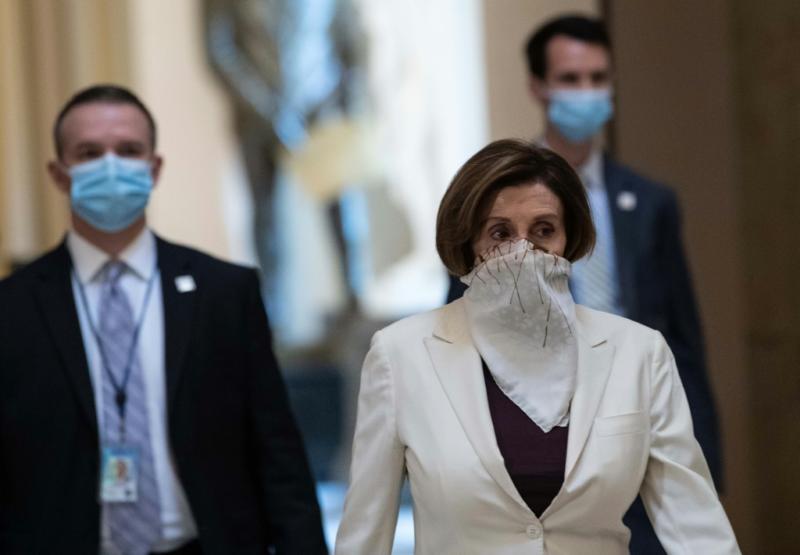EU, US grapple with how to save virus-hit economies
US House Speaker Nancy Pelosi wears a mask as she walks out of the chamber during discussion of a coronavirus relief package (NICHOLAS KAMM)
Brussels (AFP) – European and US leaders grappled Thursday with how to move forward on rescue plans for economies ravaged by the coronavirus pandemic as US jobless claims soared to a staggering 26 million.
The European Union is deeply split between the indebted — and virus-hit — south and the wealthier north, imperilling plans for a rescue package that could top one trillion euros.
Speaking by video to the 27-nation bloc’s leaders, European Central Bank chief Christine Lagarde warned “there was a risk of acting too little, too late” and said that virus lockdowns could shrink GDP by as much as 15 percent this year, a source said.
In the United States, the House of Representatives — voting, in a break with precedent, in small groups — was set to approve nearly half a billion dollars in new funding but rifts grew between Washington and state leaders.
A growing number of governments are looking to ease lockdowns that have affected half the world’s population in hopes of reviving from a sudden economic catastrophe whose scope rivals the Great Depression nearly a century ago.
But fears are rising that moving too fast could unleash a second wave of COVID-19 cases.
While the disease appears to be peaking in Europe and the United States, other nations are still in the early stages of the fight that has killed more than 180,000 people and infected 2.6 million worldwide.
– Spirit of solidarity’ –
In Europe, the worst-hit continent with 110,000 deaths, EU leaders after haggling by video conference asked the European Commission, the bloc’s executive arm, to come up with a rescue plan by May 6, sources told AFP.
The fight has reopened the wounds of the 2009 economic crisis with debt-laden southern states such as Spain and Italy, both badly hit by the disease, demanding help to get back on their feet.
“With the pandemic, nobody calls,” says Pedro Oran, a 53-year-old Spaniard who usually works by helping a plumber, as he lined up to collect food for the first time at a Madrid soup kitchen.
But richer northern countries like Germany and the Netherlands, while saying they are ready to help for now, insist they will not take the long-term step of pooling debt with Mediterranean governments they accuse of profligacy.
“In the spirit of solidarity, we should be prepared to make completely different, that is to say significantly higher contributions to the European budget over a set period,” German Chancellor Angela Merkel told lawmakers in Berlin.
– ‘Dumb idea’ –
In the United States — the hardest-hit country — data showed another 4.4 million US workers filed claims for jobless benefits, bringing the total to 26.4 million since the pandemic intensified there in mid-March.
The House of Representatives was voting on another $480 billion to prop up the US economy, battered by government-ordered shutdowns to stop a virus that has already killed more than 47,000 and infected nearly 850,000 Americans.
In unprecedented scenes for the tradition-bound House, lawmakers donned masks and voted in small groups to prevent transmission.
The Senate passed the bill Tuesday — reaching a consensus that allowed members to stay out of Washington — but the more unwieldy House had to sort out disputes.
The Democratic-led House wants to set up a panel to keep tabs on the billions in funds, amid concern that President Donald Trump will reward political allies in an election year.
Tensions have soared after Republican Mitch McConnell, the Senate majority leader, said it was too costly to give direct aid to states and suggested that they should instead declare bankruptcy.
The worst-hit states such as New York are solidly Democratic and fear they will run out of money to fund core services such as police, firefighters and schools.
“This is one of the really (most) dumb ideas of all time,” New York Governor Andrew Cuomo told reporters.
“Not to fund state and local governments is incredibly short-sighted,” he said.
– Gradual easing –
Some European countries have slightly eased coronavirus measures but bans on large gatherings have been extended. Restaurants, bars and sporting events remain off limits.
South African President Cyril Ramaphosa said that a five-week lockdown would be slowly relaxed starting on May 1.
“We will implement what we call a risk-adjusted strategy through which we take a deliberate and cautious approach to the easing of current lockdown restrictions,” he said in a televised speech.
South Africa, which has the continent’s highest number of coronavirus cases at 3,953, has seen the spread of infections slow under the lockdown.
But authorities have struggled to keep people indoors, especially in overcrowded townships, and many businesses feared they would not be able to recover from a prolonged shutdown
In the United States, the southern state of Georgia will move swiftly to reopen with the Republican governor giving approval for many businesses to lift their shutters on Friday.
The governor, Brian Kemp, described his order as “methodical” and comes after a series of protests by right-wing Americans who say stay-at-home orders violate personal liberty.
But even Trump has voiced disagreement and Mayor Keisha Lance Bottoms of Atlanta, the state’s capital and largest city, has voiced alarm and pointed to rising infections and deaths in the state.
Restrictions will be especially complicated for the Islamic world which on Friday begins Ramadan, when Muslims are forbidden from eating and drinking when the sun is up.
The World Health Organization and other health experts have warned that strict measures should remain until there is a viable treatment or vaccine.
The race is on around the world, with Britain’s Oxford University launching a human trial of a potential coronavirus vaccine on Thursday. Germany announced that similar trials will start by next week.
While the planet looks to science for a cure, the response to the coronavirus is becoming increasingly politicised.
China announced on Thursday that it will donate another $30 million to the WHO to help fight the pandemic, days after Trump said he would freeze funding to the UN body.
Trump accused the WHO of covering up the seriousness of the COVID-19 outbreak in China before it spread around the rest of the world. The US is the WHO’s biggest contributor.
burs-sct/it
Disclaimer: Validity of the above story is for 7 Days from original date of publishing. Source: AFP.


